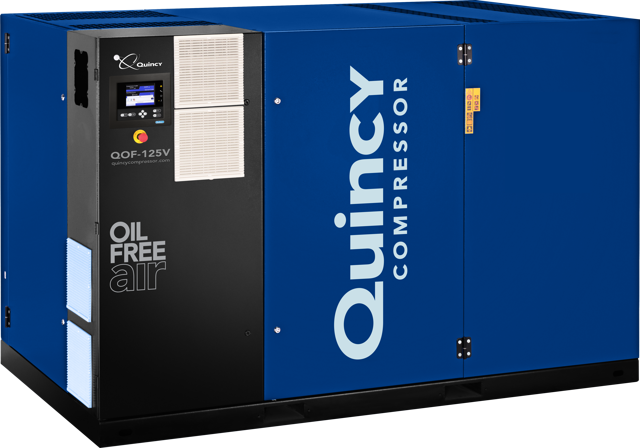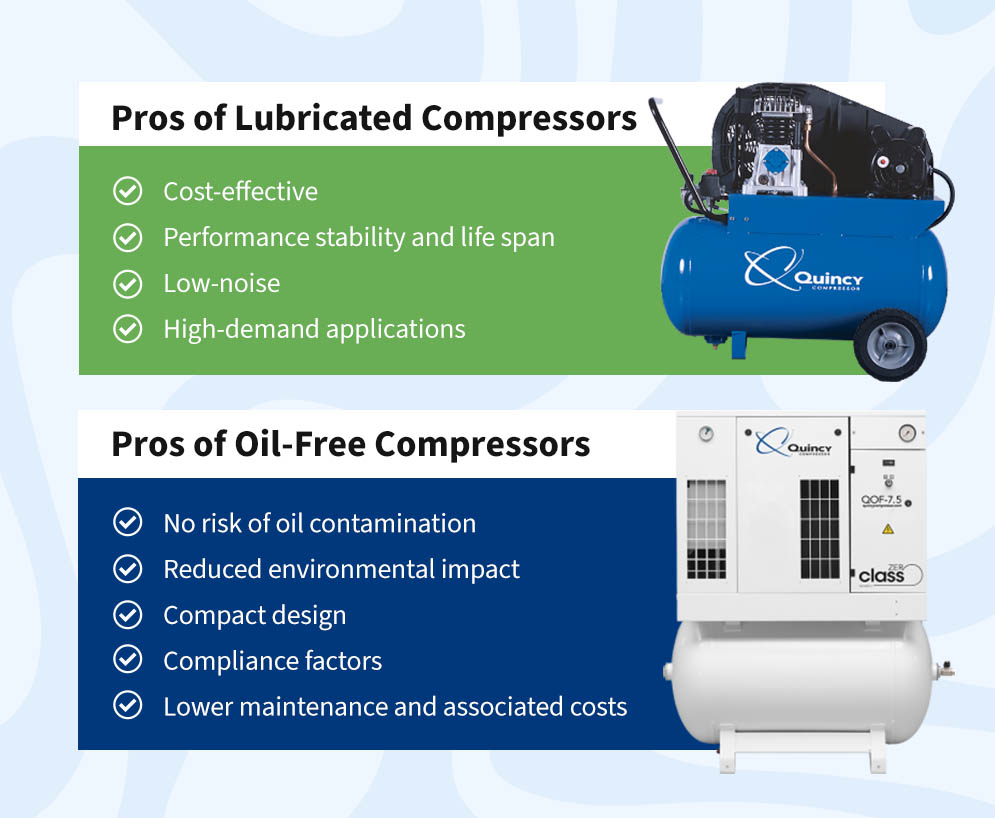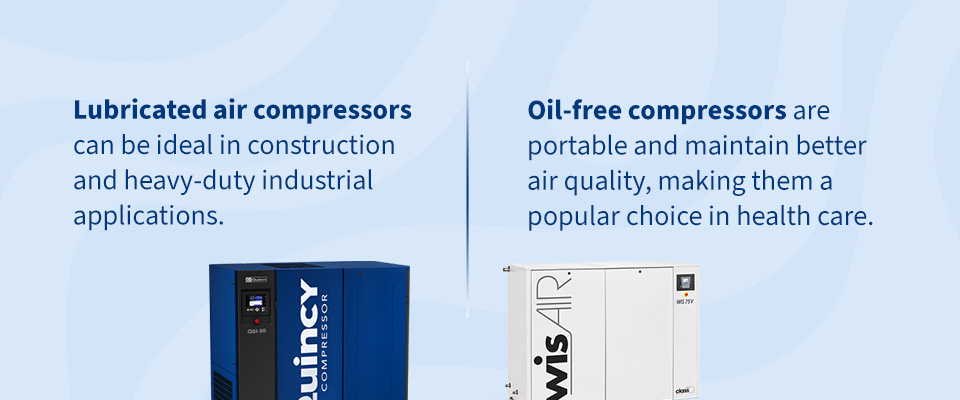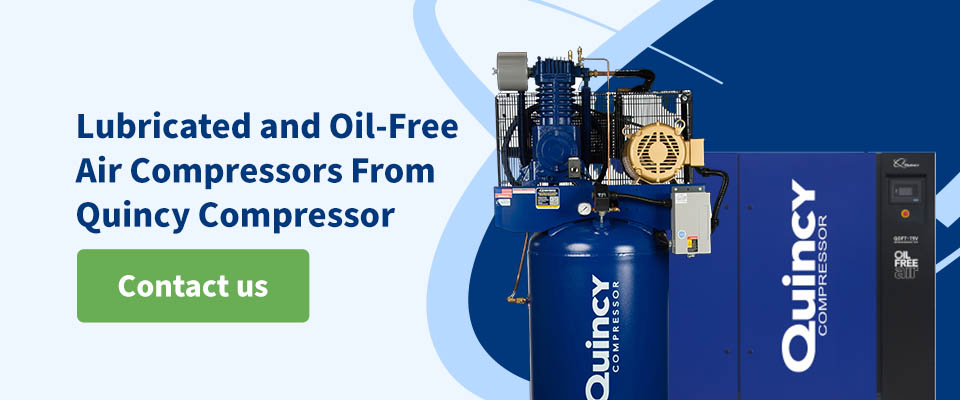 The choice between lubricated and oil-free air compressors impacts various industries and applications. Despite both types of compressors serving the same purpose — generating compressed air — they fundamentally differ in their operation and maintenance requirements.
The choice between lubricated and oil-free air compressors impacts various industries and applications. Despite both types of compressors serving the same purpose — generating compressed air — they fundamentally differ in their operation and maintenance requirements.
When you understand the distinction between oil and oil-free air compressors, you can make an informed decision to ensure your compressed air system aligns with your operational needs and environmental objectives.
Lubricated Compressors
Also known as oil-flooded or oil-lubricated air compressors, lubricated compressors use oil as a lubricant and coolant in the compression chamber. Leading features include the following.
- Lubrication and wear reduction: The compressor’s oil serves multiple purposes aside from lubrication. It reduces wear and tear, seals the compression chamber and cools the compressed air or gas. Often, you will see a separate oil circulation system and reservoir that maintains the lubrication aspect.
- Positive displacement: Lubricated compressors work on the principle of positive displacement. Using a piston or rotary mechanism, they draw in air or gas and compress it by reducing the compression volume in the chamber. Oil in the compression chamber reduces friction, dissipates heat and seals gaps to create efficient compression.
Applications for Lubricated Compressors
Lubricated air compressors are robust and offer reliable performance for various industries, including automotive, construction and manufacturing.
Pros and Cons of Lubricated Compressors
Oil-lubricated compressors are hardy equipment that offer operators or owners a host of benefits.
- Cost-effective: Oil-lubricated air compressors tend to cost less upfront than alternatives.
- Performance stability and life span: This type of air compressor is highly efficient and reliable, offering consistent performance. Thanks to its design and oil’s lubricating properties, an oil-flooded compressor can enjoy a longer life span than oil-free air compressors.
- Low-noise: Lubricated air compressors operate quietly compared to similar industrial equipment.
- High-demand applications: Lubricated air compressors typically have a durable construction, making them ideal for high-demand applications.
Though lubricated air compressors are sturdy and long-lasting, consider these disadvantages.
- Risk of oil contamination: The most noticeable downside to lubricated air compressors is the potential risk of oil contaminating the air and product.
- Regular maintenance requirements: Because these machines contain oil and filtration systems, they require frequent upkeep.
Maintenance Tips
Help your oil-flooded air compressor operate for longer by keeping up with the maintenance of its various components. Periodically check the following.
- OEM-approved oil: Oil approved by the original equipment manufacturer is the best choice to support your air compressor’s integrity and functionality.
- Airend inspection: Overheating, condensation, poor lubrication and corrosion can damage the airend, resulting in a breakdown. Avoid downtime by inspecting this component regularly.
- Oil and air leaks: Leaks decrease operational efficiency, and you can find them with ultrasonic detection technology.
- Check the hoses: Cracks and corrosion can result in leaks that reduce your air compressor’s energy efficiency.
- Drain condensation: Regularly draining the receiver tank keeps it clean, ensuring it operates effortlessly.
Oil-Free Compressors
Oil-free air compressors, also called oil-less air compressors, use pre-lubricated materials like water or Teflon to coat cylinders, with some of these compressors using water to cool and lubricate. Like lubricated air compressors, oil-free compressors have rotors with tight mechanical tolerances that reduce component friction. The difference is that oil-free compressors deliver clean, contaminant-free compressed air.
Applications for Oil-Free Compressors
Oil-free compressors are essential in industries that require cleanliness to ensure no contamination from oil condensate. These include pharmaceuticals and food and beverages.
Oil-Free Compressors Pros and Cons
Oil-free compressors are better for specific applications, thanks to some of their benefits.
- No risk of oil contamination: The primary advantage of opting for an oil-free compressor is the reduction of oil contamination in the airstream. You enjoy drier, cleaner air with an oil-free compressor, which is especially crucial if you have sensitive applications and must avoid product contamination.
- Reduced environmental impact: An oil-free air compressor is a wise choice to lessen your impact on the surrounding environment. Since these air compressors do not use oil, there is no risk of spills or leaks.
- Compact design: You can find these air compressors in compact designs for workspaces with limited space.
- Compliance factors: Because they produce clean air, oil-free compressors often comply with industry certifications and air quality standards. If reducing your carbon footprint is a priority, remember that not all air compressors are equal. Shop for an energy-efficient air compressor to help you comply with government regulations.
- Lower maintenance and associated costs: No matter which compressor you have, it will require regular maintenance to run optimally. However, compared to lubricated compressors, oil-free compressors require less upkeep, and the costs associated with maintaining them may also be lower.
While oil-free compressors have many advantages, you must also consider the possible drawbacks.
- Higher upfront costs: The initial costs of investing in an oil-free air compressor are generally more expensive than their oil-flooded counterparts.
- Potential overheating: Oil-free air compressors generate higher temperatures than oil-flooded counterparts, leaving them vulnerable to overheating.
- Noise levels: Generally, oil-free compressors are noisier than lubricated air compressors. Remember this, as you may also need to buy high-quality sound-absorbing panels.
Maintenance Tips
Oil-less compressors have less rigorous maintenance needs. However, as with any piece of machinery, you need to conduct routine inspections to keep it functioning longer. Part of this is checking for any leaks, damage or signs of wear.
- Change the air filters: Regularly replace the air filters to prevent air intake contamination, ensuring the air quality remains optimal.
- Monitor lubrication: Though this air compressor does not use oil, some models have a small oil system to cool the machine. Check these oil levels periodically to ensure they stay in the recommended range.
- Vibration analysis: Perform a vibration analysis occasionally to identify abnormal vibrations and misalignments in the compressor components.
- Condensate drain: Routinely drain the condensate from the air receiver or tank to prevent moisture buildup. Be sure to dispose of the drainage properly, according to environmental regulations.
Oil vs. Oil-Free Air Compressors — Choosing Between the Two
Many operators wonder if oil-free air compressors are better, since they tend to have more modern designs. However, choosing a suitable compressor depends on what you will use it for and whether air quality is a priority. The differences between oil-free vs. lubricated air compressors extend beyond the presence of oil. Lubricated air compressors can be ideal in construction and heavy-duty industrial applications. In contrast, oil-free compressors are portable and maintain better air quality, making them a popular choice in health care.
Durability
Lubricated compressors come with a longer life expectancy. Because they use oil, components experience less friction, wear and tear. This durability makes these compressors well-suited for commercial applications where they will run continuously.
Size
As oil-free compressors do not feature an additional chamber for oil reserves, they are often smaller than lubricated compressors. Their size makes them portable — a good choice for work sites. Lubricant air compressors are more challenging to move around, making them better for applications where they can stay in one spot.
Noise
Noise levels can disrupt operations, making this a primary consideration when choosing an air compressor. Lubricated air compressors are optimal if you are looking for a quiet device, as their oil use allows them to produce less sound. You can also choose between oil-free and lubricant air compressors based on safe noise levels in various workspaces.
Environmental Impact
Lubricated and oil-free air compressors have different environmental impacts. Oil exposure makes it challenging to keep the air clean. Oil-free compressors are the right choice if you work in the food processing, pharmaceutical or electronics sectors or must follow strict air quality guidelines. Lubricated air compressors can suffer oil contamination, whereas oil-free compressors provide air that contains no oil vapor or particulates.
Maintenance
Lubricated compressors require more maintenance, including oil changes, to perform optimally. However, that should not be your only deciding factor. While oil-free compressors need less scheduled maintenance, they have a shorter life span.
Lubricated and Oil-Free Air Compressors From Quincy Compressor
Lubricated and oil-free air compressors are suitable for different applications. No matter your industry’s requirements, purchasing quality air compressors from a reliable provider will ensure you get the appropriate equipment for your operation.
With a legacy built over 100 years, Quincy Compressor delivers high-quality air compressors to suit your specific industry needs. We manufacture our products to stringent standards, including energy-efficient, oil-free air compressors. Shop our catalog online or contact us today, and an industry expert will reach out to help you find the product that best suits your application.




